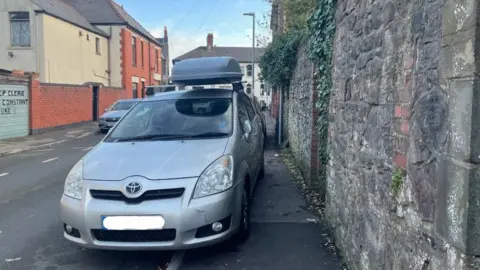Welsh pavement parking fine plans delayed
 BBC
BBCPlans to give councils powers to fine pavement parkers have been delayed.
It follows complaints from Welsh councils that ministers are asking them to implement too many new transport policies at the same time.
The Welsh government planned to consult and introduce the new law by the end of this year, but a consultation will not now start until 2024.
Plaid Cymru's Llyr Gruffydd said it was the right decision when councils are under huge pressure.
Under the plans pavement parkers could face fines of up to £70.
The original proposals would have seen the new law introduced the same year that the Welsh government planned to implement a default 20mph speed limit in urban areas.
Last month two senior Labour councillors put their names to a long list of complaints from council leaders about Welsh government transport policy.
It complained about the recent roads review which scrapped all major road projects, and raised concerns about plans to scrap Covid-era bus support, now planned to end in July after a short extension.
Written on behalf of the Welsh Local Government Association (WLGA), the letter said councils are "struggling to manage" the "sheer volume of transport-related issues".
"There is a long list of transport-related projects and requirements, all of which are being taken forward simultaneously. The proposal on pavement parking enforcement is just the most recent example," the letter said.
"This is placing councils' highways and transport staff under great pressure with much of it being on top of the 'day job', such as maintaining highways and structures, keeping daily bus services running smoothly."
In a statement released on Monday, the Deputy Minister for Climate Change Lee Waters said he had "listened to the feedback" from council leaders.
Mr Waters said the delay "will enable local authorities to focus on the implementation and introduction of default 20mph speed limits in September 2023 and the work to prepare for bus franchising".
The latter is the government's plan to reform the bus network, aiming to give councils more control over routes run by private companies.
He did not say when the legislation would be put to the Senedd.

Analysis by David Deans, BBC Wales political reporter
It didn't do so publicly, but the WLGA had set its sights on almost all of Lee Waters' transport plans in the letter leaked in March.
On the face of it, Monday's statement from Mr Waters reads as a bid to smooth things over with local government leaders.
It is effusive with praise for councils, saying Mr Waters wanted to "put on record my thanks to all local government elected members and staff for the critical work that they do".
That is really interesting when you consider the senior Labour leaders inking the letter complained of the "tone" taken in meetings with Mr Waters.
But the question remains whether the Welsh government can damp down the internal criticism it faces within Labour.
Pavement parking remains just one of the concerns.
